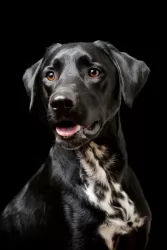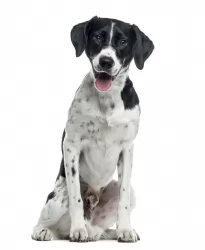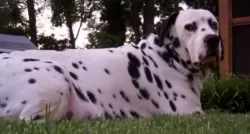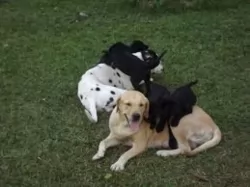 MyDogBreeds
MyDogBreeds St. John's Water Dog is originated from Canada but Dalmador is originated from United States. Both St. John's Water Dog and Dalmador are having almost same height. St. John's Water Dog may weigh 9 kg / 20 pounds more than Dalmador. Both St. John's Water Dog and Dalmador has almost same life span. Both St. John's Water Dog and Dalmador has almost same litter size. St. John's Water Dog requires Low maintenance. But Dalmador requires Moderate maintenance
St. John's Water Dog is originated from Canada but Dalmador is originated from United States. Both St. John's Water Dog and Dalmador are having almost same height. St. John's Water Dog may weigh 9 kg / 20 pounds more than Dalmador. Both St. John's Water Dog and Dalmador has almost same life span. Both St. John's Water Dog and Dalmador has almost same litter size. St. John's Water Dog requires Low maintenance. But Dalmador requires Moderate maintenance
 The breed known as the St. John’s water dog is an extinct landrace breed. They were domestic dogs found in Newfoundland and at times were called the lesser Newfoundland. There is not much information available about the other breeds that went into its development. Hypothetically it is believed they are a mix of the Irish, Old English and Portuguese dogs bred to work.
The breed known as the St. John’s water dog is an extinct landrace breed. They were domestic dogs found in Newfoundland and at times were called the lesser Newfoundland. There is not much information available about the other breeds that went into its development. Hypothetically it is believed they are a mix of the Irish, Old English and Portuguese dogs bred to work.
It is also thought that other breeds in their family tree, descending from them, include the Golden Retriever, the Flat-Coated Retriever, the Chesapeake Bay Retriever, the Labrador and the Curly-Coated Retriever. The Newfoundland is also related to the St. Johns Water Dog through the line of Rafeirio do Alenteios that Portuguese fisherman brought to the island.
The breed was exported to England in the 19th century and early 20th. There the breeds of retrievers were developed. In Canada during this time frame restrictions were placed on dog ownership in order to encourage people to raise sheep. At the same time England imposed a long quarantine on all animals coming into the country in order to get rid of rabies. These two factors contributed greatly to the extinction of the breed. It seems the last two dogs were seen in a remote area in the 1980’s. All attempts to save the breed failed.
 The Dalmador is a cross-breed – a mix between a Dalmation and a Labrador, and because it is a a fairly new breed you won’t find much information about the dog’s origins.
The Dalmador is a cross-breed – a mix between a Dalmation and a Labrador, and because it is a a fairly new breed you won’t find much information about the dog’s origins.
We do know that the Labrador originated in Canada and that the Dalmation comes from Croatia. Both these dog breeds have their own interesting histories. The Dalmador is a hybrid dog and isn’t a member of the American Kennel Club.
They started coming about from the 1980s when mixing one pure-breed dog with another became popular.
 St. John’s Water Dog is strong, medium sized and stocky. They looked more like English Labs than American Labs. They had a thick, short coat, loved swimming, had a lot of endurance and rudder tail. It was also described as a thin, black dog with short hair. They had white patches on their chest and feet. His nose was thin and tapered, his legs powerful, his chest muscular. The breed is quick, swims, runs quickly and is a fighter as well.
St. John’s Water Dog is strong, medium sized and stocky. They looked more like English Labs than American Labs. They had a thick, short coat, loved swimming, had a lot of endurance and rudder tail. It was also described as a thin, black dog with short hair. They had white patches on their chest and feet. His nose was thin and tapered, his legs powerful, his chest muscular. The breed is quick, swims, runs quickly and is a fighter as well.
Never accepted by any major kennel club except as a foundation breed. They became extinct.
 The Dalmador is a cross breed dog which comes from crossing the Labrador Retriever with a Dalmatian. The result is a muscular, well proportioned body.He has floppy ears and a long tail.
The Dalmador is a cross breed dog which comes from crossing the Labrador Retriever with a Dalmatian. The result is a muscular, well proportioned body.He has floppy ears and a long tail.
He is medium to large sized dog and can stand up to 58cm in height and weigh between 25 and 32kg. No two dogs look the same and some dogs gravitate more towards the one breed while others toward the other.
Most Dalmadors have the spotted coat, although the coat could have very visible spots or maybe just a few dots on the fur. Then again there are some Dalmadors where the coat is more of a solid color in brown or black or cream with some white patches. The double coat is short and dense and he is quite a heavy shedder.
The Dalmador is a gentle, friendly dog, making him a great family pet. You can’t really say exactly what temperament your Dalmador will have as he could inherit either the Dalmatian’s more aloof nature or he could inherit the friendly character of the Labrador.
He is quite likely to be even-tempered and is amicable with other pets in the home. He is alert too and this makes him a good watchdog. Because the Dalmador is the hybrid of two active, alert, intelligent breeds you can expect a dog which for some will be quite a handful. It is why training and socialization can be excellent for the Dalmador as it will calm him down, turning him into an obedient dog who comes and sits when told.
If you’re looking for an energetic, active and highly social dog, the Dalmador will suit an active family that can join in with all his high jinks.
 3.Adaptability large need fence, they are not large dogs but they need outdoor space
3.Adaptability large need fence, they are not large dogs but they need outdoor space
 The wonderful Dalmador is such a easy-going, cheerful dog full of surprises really, as you never know which dominant traits he will inherit from either of the two dogs involved in his making.
The wonderful Dalmador is such a easy-going, cheerful dog full of surprises really, as you never know which dominant traits he will inherit from either of the two dogs involved in his making.
Friendly and social, he loves his human family and is totally loyal and loving toward them. Even tempered and faithful, if you’re looking for a wonderful 4-legged friend and companion, the Dalmador promises to make you a splendid pet.
 There is no documented history of any genetic or hereditary illnesses in the breed. However, it seems rational to believe they suffered from ailments similar to Labradors and newfoundland though they are smaller dogs.
There is no documented history of any genetic or hereditary illnesses in the breed. However, it seems rational to believe they suffered from ailments similar to Labradors and newfoundland though they are smaller dogs.
 The Dalmador is a hybrid dog and they don’t experience the same health issues that the pure bred dog contends with. The Dalmador has a life expectancy of 10 to 14 years and he can reach this age if you give him all the doggy care he deserves as a 4-legged member of your family.
The Dalmador is a hybrid dog and they don’t experience the same health issues that the pure bred dog contends with. The Dalmador has a life expectancy of 10 to 14 years and he can reach this age if you give him all the doggy care he deserves as a 4-legged member of your family.
Apart from a common dog ailment – hip dysplasia, bloat and obesity are also common problems for your dog.
Bloat is a serious health condition that can actually be fatal because its a twisted stomach where trapped gas puts pressure on the diaphragm.
You will notice the swollen stomach of your pet. Larger breeds are more prone to suffer from bloat because of being deep-chested. Also known as gastric dilatation-volvulus, a vet will need to intervene with this ailment as it can be life-threatening.
 1Feeding the puppy – Don’t overfeed – they have a propensity toward obesity. Feed high quality, high protein 3 x a day.
1Feeding the puppy – Don’t overfeed – they have a propensity toward obesity. Feed high quality, high protein 3 x a day.
2.Feeding the adult – Don’t overfeed. Feed a high quality, high protein 1-2 x a day.
4. Games and Exercises – They need space to run and they love to explore. They would also love to be near water where they could swim. Good at dock diving, field trials, flyball and frisbee.
 The Dalmador is a medium to large dog so you want to be feeding him one or two bowls of food a day. You want to be giving your Dalmador top-quality food to ensure good health. The lower quality foods are inclined to have ingredients in them that aren’t good for your pet.
The Dalmador is a medium to large dog so you want to be feeding him one or two bowls of food a day. You want to be giving your Dalmador top-quality food to ensure good health. The lower quality foods are inclined to have ingredients in them that aren’t good for your pet.
Always try to include some home-made food into your pet’s diet such as cooked brown rice, cooked chicken and vegetables. You can mix this into some of his dry kibble. It is important to include some raw meat into his diet from time to time as well.
Clean water must be constantly available. Without good quality food and water, you jeopardize the health of your pet.
He isn’t going to require much maintenance so a good brush twice a week will rid him of loose hairs and keep his coat shiny and glossy.
Other things to check regularly are his ears and to brush his teeth 2 or 3 times a week. Don’t neglect giving him a good amount of exercise too.